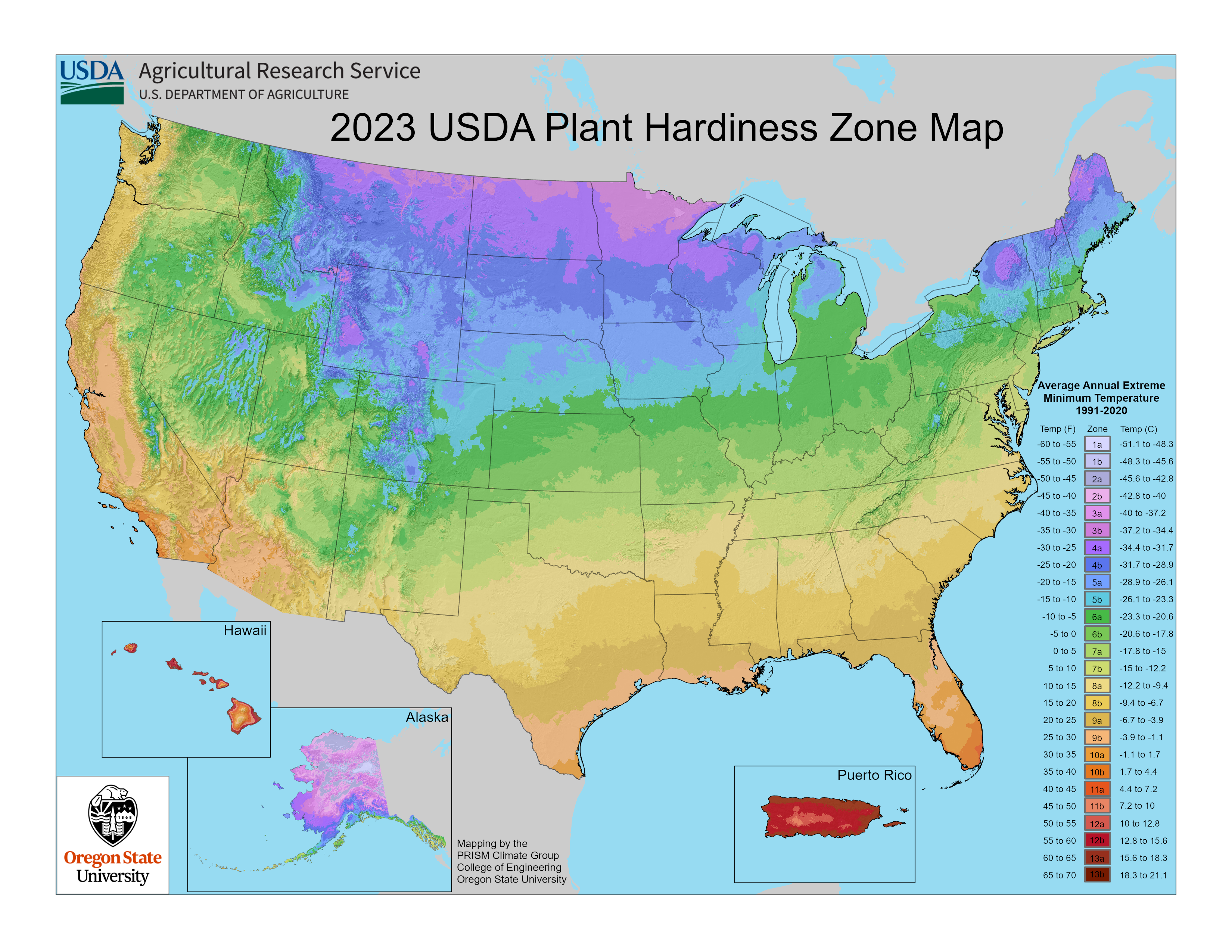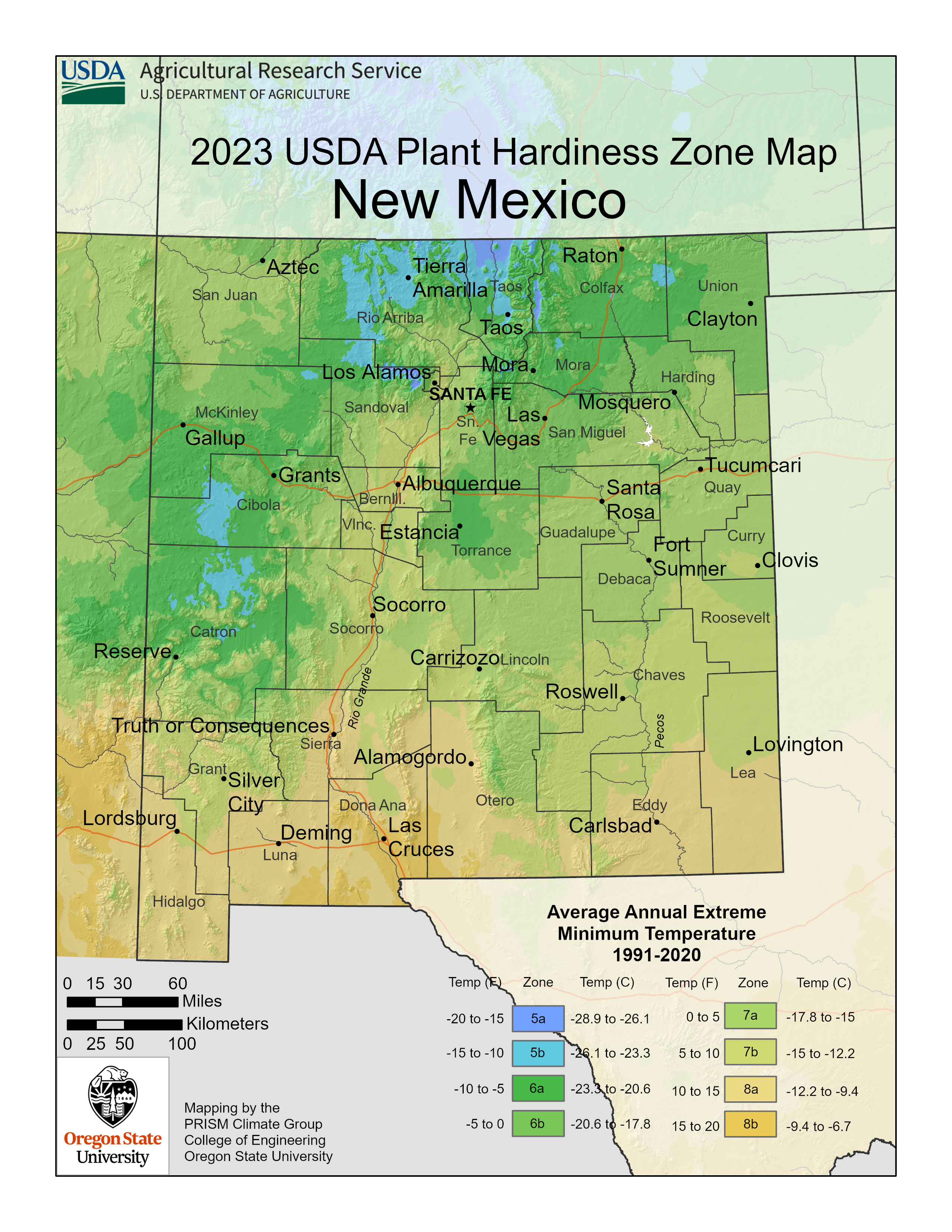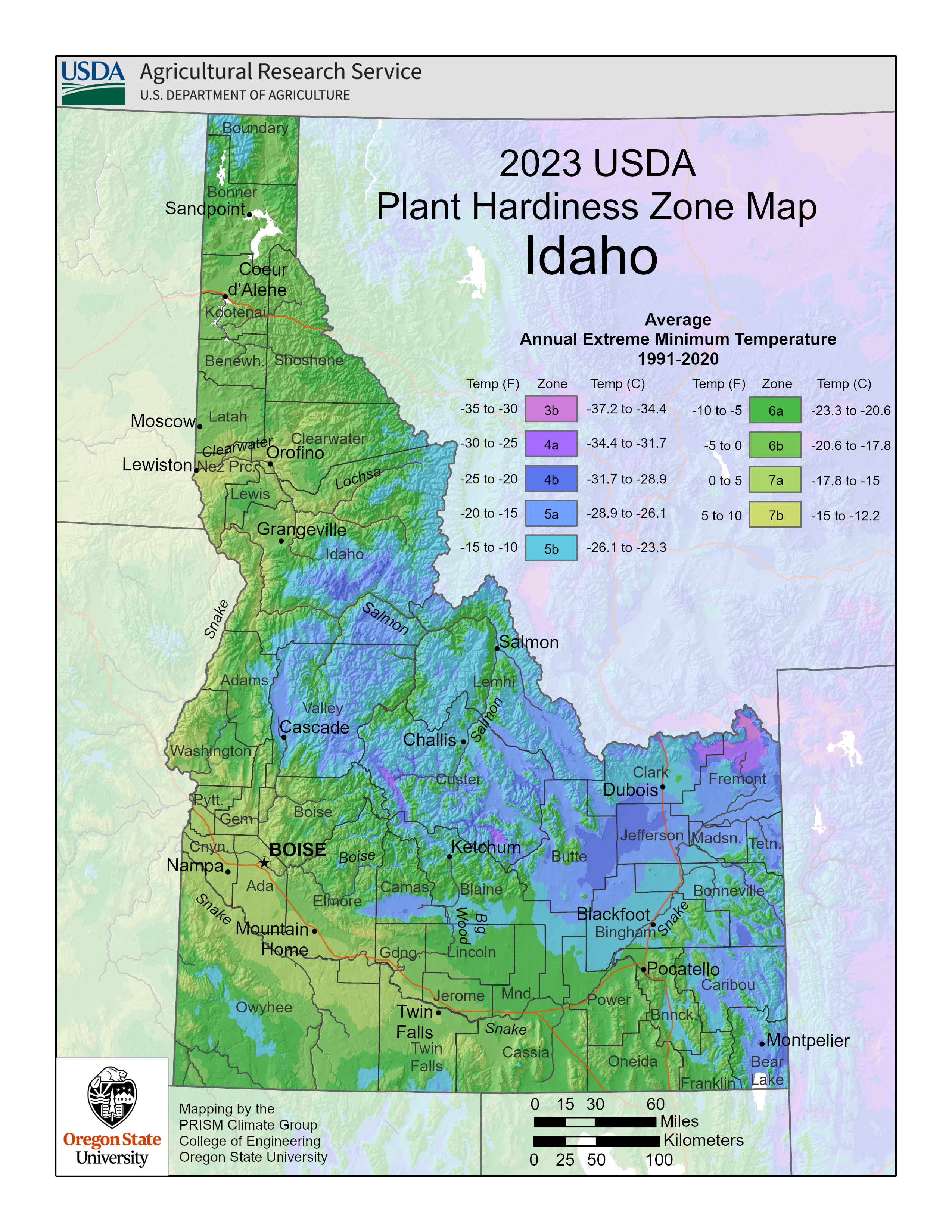Mushroom compost is versatile and useful. It’s great for adding moisture to gardens, lawns, and flower beds before the plants go in.
But not all plants respond well to what mushroom compost has to offer.
Some plants don’t like mushroom compost. The family of ericaceous plants doesn’t do well in mushroom compost because of its alkalinity. Mushroom compost doesn’t have the acidity that ericaceous plants need. Though it’s good for use with bushes, trees, perennials, and vines, it’s not ideal for all plants.
In this post, we’re looking at 10 plants that don’t like mushroom compost.
We’ll also explore some facts about mushroom compost and how it is best applied.
Keep reading to learn more about what this type of compost has to offer, as well as why it doesn’t work for some plants.
About Mushroom Compost
Mushroom compost comes from mushroom farming.
It’s made from what’s left over after a mushroom harvest. For that reason, it’s sometimes referred to as spent mushroom compost.
You can think of mushroom compost as a conditioner. Just as we use conditioners in our hair to add moisture and nutrients, mushroom compost does the same thing for soil.
It helps the soil retain more moisture for plants to draw on, while also providing much-needed nutrients.
Mushroom compost often has high alkaline levels. It also neutralizes acids in soil.
Important To Know: Plants that need pH levels below the alkaline level won’t thrive in mushroom compost. The pH of mushroom compost ranges from 6.0 to 7.0+.
How to Use Mushroom Compost to Plant
One way to use mushroom compost is to add it to your soil before you plant.
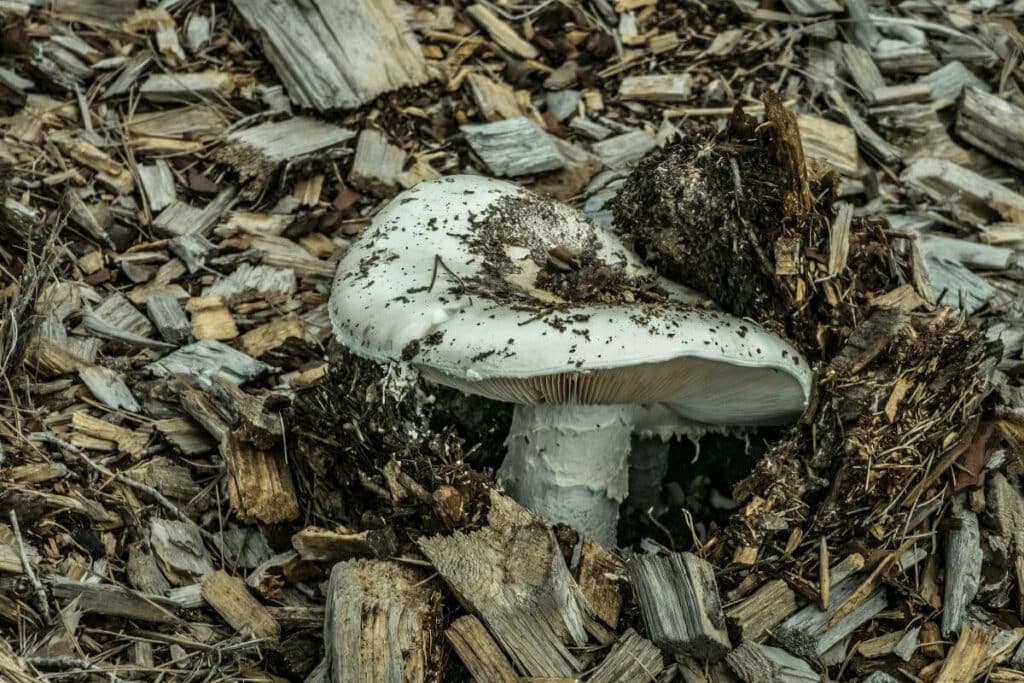
For instance, if you’re creating a vegetable garden, you can mix mushroom compost into the soil.
It’s also a good addition to the layer of soil before you put sod down.
Mushroom compost is ideal for perennial beds, also. Lay a good, thick 3-inch layer over your annual or perennial bed.
Then, dig down 6 inches to do your planting. This gives you the best outcome.
When using mushroom compost for your lawn, you won’t need to add anything more throughout the season. Make sure you continue watering it and addressing any weeds.
You get the most benefit from mushroom compost with plants when you apply it right at the stem base. This allows the plant to take in the most nutrients easily.
You can also use mushroom compost for potted houseplants. You don’t need much.
Apply the compost in a thin layer over the soil.
Make sure your pot has an ample amount of drainage holes.
Ericaceous Plants Dislike Mushroom Compost
Ericaceous plants are acid-loving plants.
Mushroom compost has a high alkalinity level. That means it does a good job of neutralizing acids.
Ericaceous plants thrive on acids found in some types of soil.
Mushroom compost would deprive these plants of something essential to their survival.
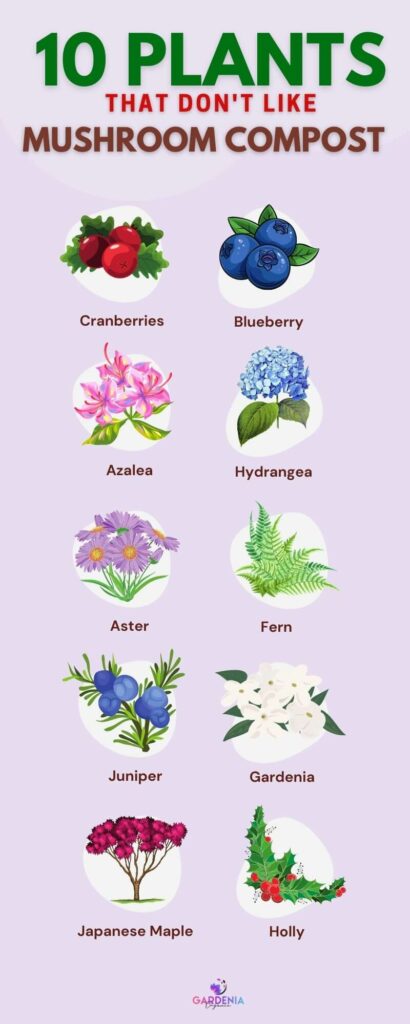
1. Cranberries
Cranberries grow best in acid soil.
They need a pH level of between 4.0 and 5.5 for the best results.
Make sure to raise or sink the grow bed, so you can control the drainage and optimize the acid level.
When choosing compost, stay away from the mushroom compost for this plant.
2. Blueberry
Blueberries also need acidic soil.
They can grow in the shade but require more in the sun.
You’ll get the best results from regular irrigation that keeps the soil moist at all times.
You can include peat moss in the soil for your blueberries to give them the best conditions.
No mushroom composting here, or the plant will not grow.
3. Azalea
Azaleas essentially starve to death if planted in alkaline soil.
Mushroom compost would simply kill this plant. Azaleas need a pH level of about 5.5 to 6.2.
Without the acid, the leaves of the bush start turning yellow.
Eventually, the bush dies out.
4. Hydrangea
Hydrangeas can tolerate mushroom compost.
They survive in both alkaline and acid soils. The color of the flowers changes based on the pH level of the soil.
Growing hydrangeas in acid soil yields blue flowers.
Mushroom compost lowers the pH levels, so you may see pink flowers.
5. Aster
Asters grow best in neutral or acidic soils.
The pH level doesn’t need to be high. Keep it between 5.8 and 6.5. Asters need moisture but not a lot.
Once they’re full-grown, you can water them about once a week.
6. Fern
Ferns can grow in alkaline soil but grow more in acidic soils.
They also thrive with moisture. If you have extremely acidic soil, you can use mushroom compost to neutralize some of the acids and lower the pH to somewhere around 5.0 to 6.0.
The compost also helps retain moisture for the fern plant.
7. Juniper
Juniper trees and bushes tolerate different soil types.
They do best in slightly acidic soil. They need good drainage.
Overwatering junipers causes the roots to rot.
Keep the pH level above 5.0 for the best results.
8. Gardenia
Gardenias need a low acid level for optimum growth.
The pH level should be between 5.0 and 6.0. If you want to plant them close to the foundation of your home, the acid level is likely too high there.
In that instance, try using a little mushroom compost to neutralize the acid.
Otherwise, plant them further from the building.
9. Japanese Maple
Japanese Maples are easy to care for.
A Japanese Maple will thrive in loamy or sandy soil. They require slight acidity to do their best.
High alkaline soils, like those mixed with mushroom compost, make it more difficult for Japanese Maples to grow.
10. Holly
Holly plants prefer acidity.
Don’t use mushroom compost to retain moisture with holly. Holly plants are grown in alkaline soil and often have yellow leaves.
Should you notice your holly plant yellowing, increase the pH level of the soil by adding mulch, peat moss, or pine needles around the plant.
What Compost to Use Instead
Mushroom compost offers a lot of nutrients to growing plants.
But alternatives exist that won’t neutralize the acids in soil that some plants need.
Try using any of the following to help your plants thrive:
- Potting soil
- Worm composting
- Poultry manure
- Cow manure
- Mulch
- Kitchen compost
Some Plants Like Mushroom Compost
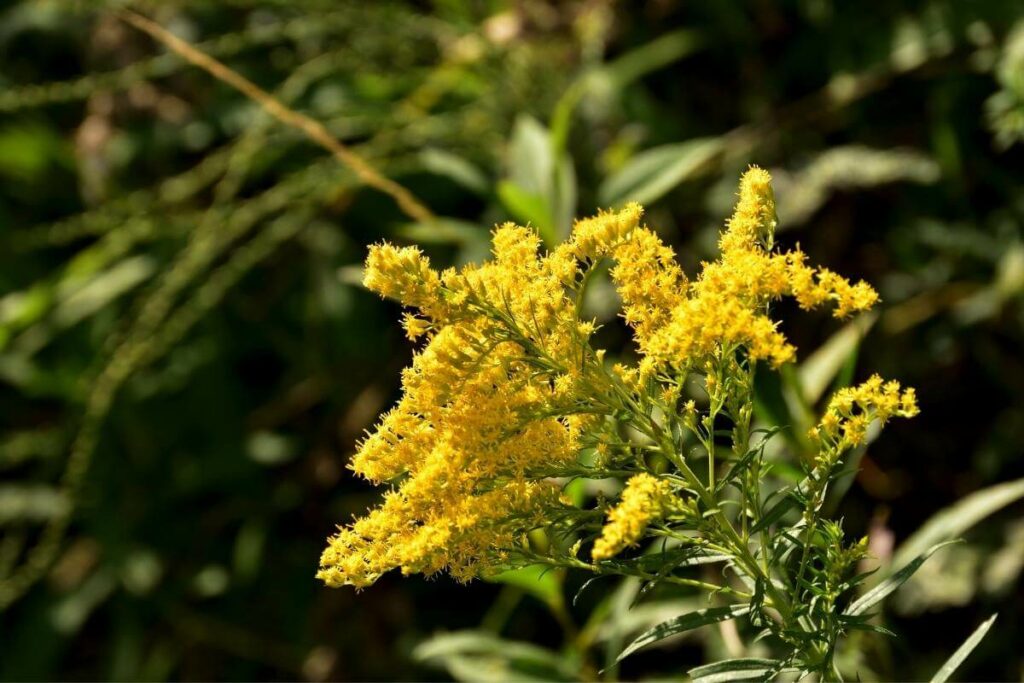
Other plants love mushroom compost and thrive in alkaline soil.
Many vegetables are this way. A lot of trees also thrive without acidic soil.
Here’s a quick look at some of the popular plants that mushroom compost works well for:
- Goldenrod
- Lavender
- Delphinium
- Easter lilies
- Columbine
- Virginia creeper
- Winter jasmine
- Boston ivy
- Lilac bushes
- Ornamental cherry
Is Compost Made From Mushrooms Safe?
Some people have concerns over whether mushroom compost is safe to use in our gardens and fields.
The claims are that mushroom farmers use chemicals during the cultivation process.
The concern is then that chemical residues exist within mushroom compost from the farms.
A best practice is to ask questions of the farmers about the chemicals they use on their mushroom crops.
Some chemical residues are toxic to your plant’s health.
Watch Out: Applying mushroom compost with toxic materials included to your plants causes damage and may even kill them.
Conclusion
Some plants don’t like mushroom compost because of its alkalinity.
Acid-loving plants in the ericaceous family don’t like mushroom compost.
Though it provides many nutrients and helps to retain moisture, it neutralizes the acid in the soil that these plants thrive on.
Use an alternative to mushroom compost for this plant family.
Related Articles
- Mushroom Soil vs Compost – 5 Main Differences
- Worm Castings vs Compost: Which is Better?
- How Much Compost to Mix with Soil
